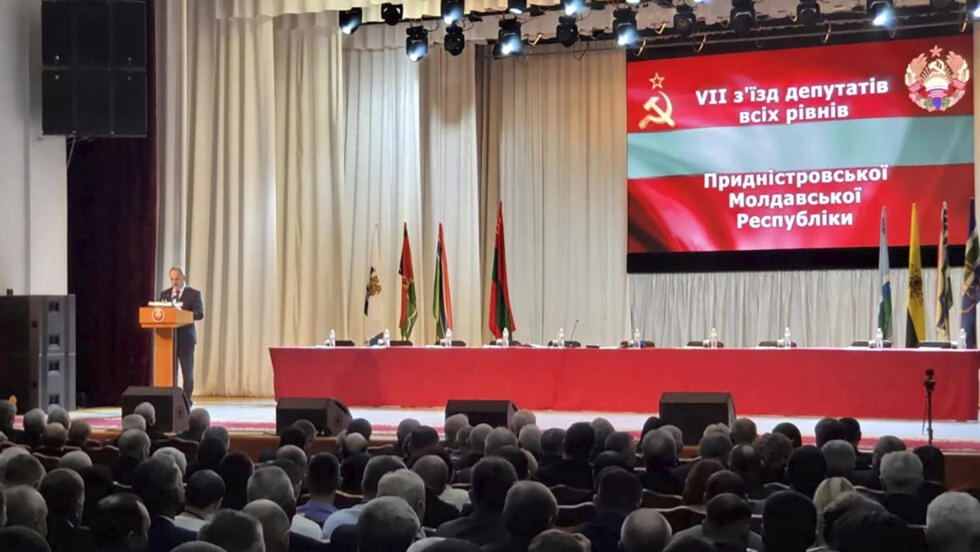Authorities from the Russian-backed Moldovan separatist region of Transnistria asked Moscow on Wednesday (28) to protect them from what they described as economic pressure from the Moldovan government. For Ukraine’s allies in Europe, the situation is “dangerous” and could mean a widening of the war.
(RFI) Meeting in Tiraspol for an extraordinary congress, the first since 2006, the deputies of Transnistria, Moldova’s pro-Russian breakaway territory, decided to adopt a declaration. In the text, quoted by Russian news agencies, the Russian parliament is called upon to “implement measures to protect Transnistria”, home to “more than 220,000 Russian citizens”, in the face of “growing pressure from Moldova”. Transnistria faces “unprecedented threats of an economic, socio-humanitarian and political-military nature”, adds the statement, which does not explain the details of the desired aid.
This announcement by Moldova’s pro-Russia separatists comes as no surprise, as it recalls the similar request made by pro-Russia separatists in eastern Ukraine in February 2022, which became one of the pretexts put forward by Vladimir Putin to launch the large-scale attack on Ukraine.
Ukrainian President Volodymyr Zelensky appealed to the leaders of the countries of South-Eastern Europe, meeting in Albania for a summit, to provide more support for his country, which lacks the ammunition to confront Russia.
Accusations of “genocide” or propaganda
The separatist authorities said that Wednesday’s congress, attended by 620 deputies, was a reaction to Chisinau’s recent imposition of customs duties on imports from Transnistria. Quoted by local media, in his speech the president of the self-proclaimed Transnistrian republic, Vadim Krasnosselski, assured that this territory was suffering “a policy of genocide”, through economic, “physical”, legal and linguistic pressures.
In this resolution, MEPs also address the Organization for Security and Cooperation in Europe (OSCE), the European Parliament, the Red Cross and, finally, the UN General Secretariat, asking them to avoid “provocations” that could lead to “an escalation of tensions”.
The Moldovan government, for its part, declared on Wednesday that “things seemed calm”, stating that “there is no risk of escalation”, despite this “new campaign aimed at creating hysteria in society”.
Moldova denounced the comments by the authorities in the pro-Russia breakaway region of Transnistria. The government “rejects the propaganda coming from Tiraspol,” Deputy Prime Minister Oleg Serebrian said on Telegram, saying that the region benefits from “policies of peace, security and economic integration” as part of its ties with the European Union.
Fear of an extension of the conflict to Transnistria
Poland’s Prime Minister Donald Tusk says he was not surprised by the request to Russia. “This shows how dangerous the situation is, and not just for Ukraine,” he said.
Washington was quick to say that it supports Moldova’s “sovereignty” after the pro-Russia separatists appealed to Moscow.
This statement by the Transnistrian MPs comes on the eve of Vladimir Putin’s traditional annual address to the nation, scheduled for this Thursday (29). The Russian president may take the opportunity to announce the deployment of Russian troops in this region on the borders of Europe.
Chisinau and the European Union (EU) regularly criticize Russia for trying to destabilize Moldova, formerly in its zone of influence, but whose authorities are oriented towards Europe. In December 2023, the EU decided to open accession negotiations with Ukraine and Moldova.
Since the beginning of the Russian attack on Ukraine two years ago, fears have been raised about a widening of the conflict. Conjectures regularly arise about a possible Russian attack from Transnistria towards the large Ukrainian port city of Odessa on the Black Sea.
Last year, the authorities of this self-proclaimed state accused Kiev of wanting to attack it, after claiming to have thwarted an attack in March targeting its leaders. Last week, the Russian Defense Ministry again claimed that Ukraine was preparing an “armed provocation” against Transnistria, but without providing any proof.
What is Transnistria?
On August 27, 1991, the Republic of Moldova proclaimed its independence after separating from the Soviet Union. However, this small Eastern European country would very quickly be stripped of part of its territory, as four months later, the Dniester Republic of Moldova seceded.
With a current population of just over 500,000, made up mainly of predominantly Russian-speaking Eastern Slavs, this region located on the other side of the Dnieper River very quickly became fully independent. Transnistria does, however, have recognition from other countries. This territory concentrates a large part of Moldovan industry and has been led, since its secession, by pro-Russian leaders who refuse any rapprochement with the European Union.
In 2014, following Russia’s annexation of Crimea, 96% of voters voted in favor of the annexation during a referendum, proof that pro-Russia sentiment is dominant in that country. In addition, since the beginning of the conflict in Ukraine in February 2022, there have been numerous incidents in Transnistria, raising fears of an intervention by Moscow. Many European leaders constantly repeat that the situation in the region is very dangerous.
(With information from RFI and AFP) *** Translated by DEFCONPress FYI team ***
